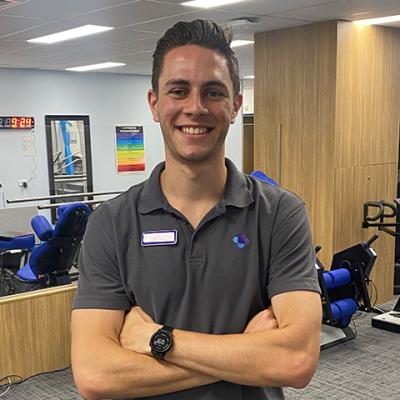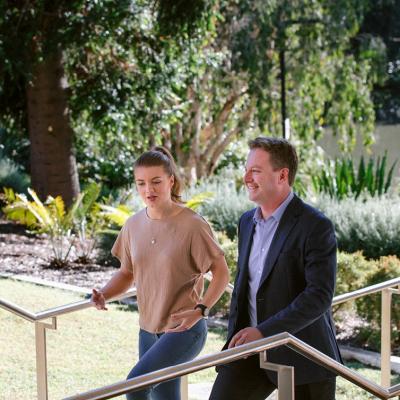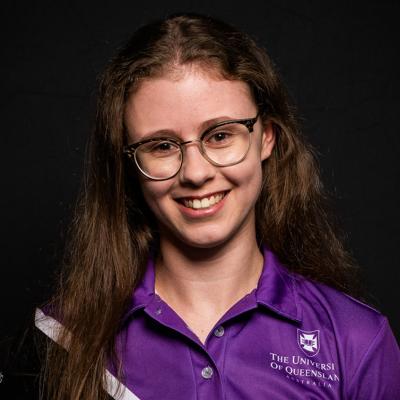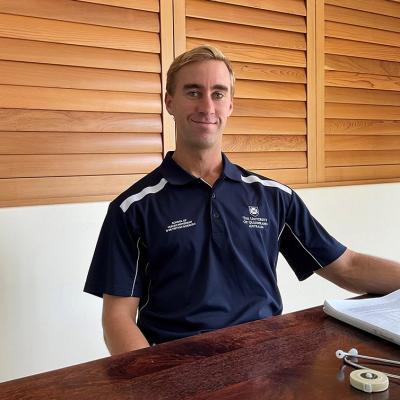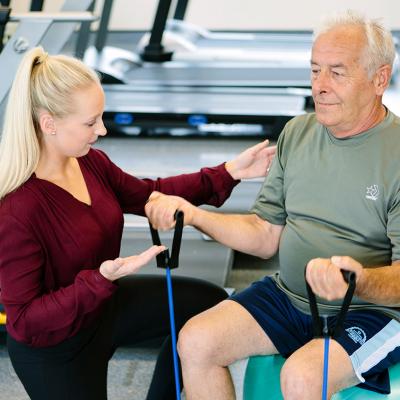If you’ve ever wondered ‘what can I do with an exercise physiology degree?’ you’ve come to the right place.
Whether you’re looking for a clinical or non-clinical career, a degree in exercise physiology is a great starting point for getting your foot in the door of this rewarding and fascinating area of health.
Exercise physiology can open up a wealth of career opportunities, as it’s a field that’s rapidly gaining momentum and value in the healthcare sector. Furthermore, Accredited Exercise Physiologists (AEPs) are one of the fastest-growing groups of allied health professionals in Australia, with Queensland employing the most exercise physiologists in the country.
So, you know a degree in exercise physiology can land you a job, but what type of job? It’s more than just adopting the title of Exercise Physiologist – there are other avenues this degree can take you down. Let’s explore them with a little help from recent UQ Bachelor of Clinical Exercise Physiology (Honours) graduate Harry Bouckley.
What to do with an exercise physiology degree
The obvious thing to do is become an Accredited Exercise Physiologist, like Harry. He explains what your daily work could look like in this role in a clinical setting.
“I’m primarily based at Logan Healthy Living, working in a multidisciplinary team to provide care to patients living with Type 2 Diabetes,” he says.
“My role includes the clinical education of upcoming exercise physiology students, developing the role of exercise physiology, and contributing to the structure and strategies within our Type 2 Diabetes self-management program.”
Harry’s is just one type of job you could find yourself in upon graduating with an exercise physiology degree. Accredited Exercise Physiologists work in a range of settings, from public and private hospitals to aged care facilities, gyms and multidisciplinary clinics. They also work with people experiencing diverse health conditions.
There’s huge scope as an Accredited Exercise Physiologist, opening up opportunities in a variety of industries and organisations. With an ageing population, the need for AEPs is also rapidly growing. People are living longer and so, inevitably, a large proportion of these people are suffering from chronic diseases, illness or injury, and would benefit from the services of an AEP.
No matter what type of role you secure as an exercise physiologist, one thing is for sure: you’ll be assisting your patients to move and exercise so they can achieve a healthier lifestyle.
“It’s important to recognise that as an Accredited Exercise Physiologist you have an opportunity to make a significant impact on the health and in the lives of your patients or clients.”
Find out more about what a clinical exercise physiologist does, where they work and who they work with.
But what other career paths can you pursue with an exercise physiology qualification?
What jobs can you get with an exercise physiology degree?
Whether you want to broaden your job prospects or take an alternate career path, a degree in exercise physiology can also set you up for success in a range of other occupations such as:
- strength and conditioning specialist
- cardiac scientist
- corporate health and fitness adviser
- rehabilitation professional
- active living coordinator
- biochemist
- respiratory technician
- physical therapist
- personal trainer.
You may need to undertake further study to secure a position in some of these roles, but a degree in exercise physiology will provide you with solid foundational knowledge to kickstart these careers.
UQ Bachelor of Clinical Exercise Physiology (Honours) graduates also have a distinct advantage in that they can also pursue an occupation as an exercise scientist with their qualification. This is because upon completion of their studies, they gain accreditation with Exercise and Sports Science Australia (ESSA) as both an Accredited Exercise Physiologist and Accredited Exercise Scientist, opening up even further job prospects.
What is the difference between exercise science and exercise physiology?
Exercise science encompasses a broader range of services and occupations centring on human movement (think sports coaches and trainers), whereas exercise physiology is concerned predominantly with improving patients’ health and movement to address or prevent a specific problem.
If you’re interested in a job where you can help people improve their lives by leading a healthier lifestyle, studying exercise physiology is a great place to start.
“Being able to help my clients improve their lives through exercise is very satisfying,” says Harry.
Where to study exercise physiology
If you want to become an accredited allied healthcare professional, the best place to study exercise physiology is at university. An accreditation will provide increased job opportunities upon graduation and studying at university will give you the opportunity to undertake placements where you can practise what you’ve learnt in class.
If you’re thinking of taking your qualification further or branching out into different areas with postgraduate study, having an undergraduate degree in exercise physiology already will be a huge benefit. At UQ, the Bachelor of Clinical Exercise Physiology comes with an embedded honours year, effectively preparing you for postgraduate study.
Harry decided to study exercise physiology at UQ because of the program’s leading reputation for excellence and access to both embedded and extracurricular learning opportunities.
“UQ prepared me for my role by providing me with the ability to think critically and become autonomous with my work,” he says.
“I found that observation was minimal, and I was able to truly apply myself and become my own practitioner whilst on placement.”
“It gave me the opportunity to express my enthusiasm and passion for exercise physiology, engage with a range of allied health professionals and make authentic connections with patients so I could have a real impact on their health and lives.”
Find out more about what it's like to study exercise physiology at UQ.
How to study exercise physiology at UQ
To study a Bachelor of Clinical Exercise Physiology at UQ you will need to:
- Meet the program prerequisites.
- Meet the entry score threshold.
For Queensland Year 12 students, this means having studied General English and either Biology, Chemistry or Physics ATAR subjects. To guarantee a spot in the program commencing January 2025, Year 12 students will need to secure an ATAR of 90; however, offers were made to students with an ATAR of 86 in Semester 1 of 2024.
If your ATAR falls a little short of this threshold, there are other pathways to the Bachelor of Clinical Exercise Physiology (Honours). You may wish to enrol in a program which covers similar courses and content, and which requires a slightly lower ATAR, and then upgrade to the Bachelor of Clinical Exercise Physiology (Honours) after a year of study, based on your performance and GPA. This is called the tertiary studies pathway to university. To take this pathway to the Bachelor of Clinical Exercise Physiology (Honours), you could first look at applying for:
- Bachelor of Human Movement and Nutrition Sciences – January 2025 guaranteed ATAR threshold of 75.
- Bachelor of Health Sciences – January 2025 guaranteed ATAR threshold of 80.
- Bachelor of Exercise and Sport Sciences (Honours) – January 2025 guaranteed ATAR threshold of 85.
If you want to study exercise physiology at university, we can help you get there. Contact our friendly team if you have questions about how to gain admission to this program at UQ.
Take the first step towards a rewarding career with a degree in exercise physiology.


